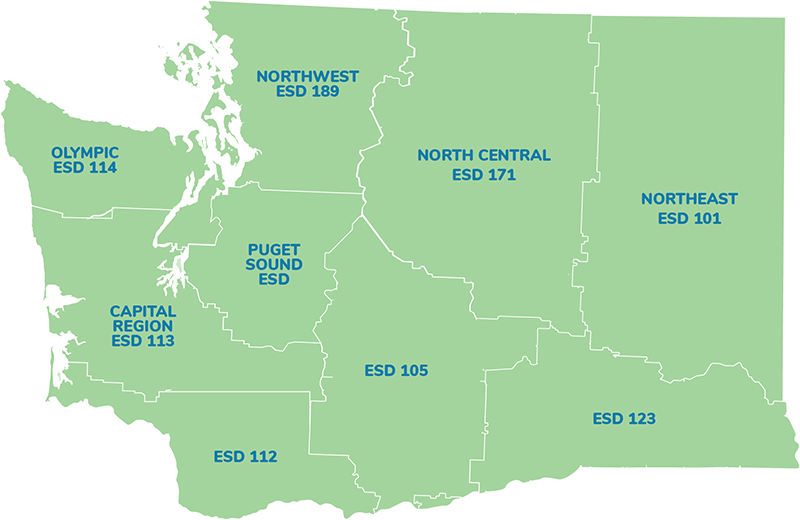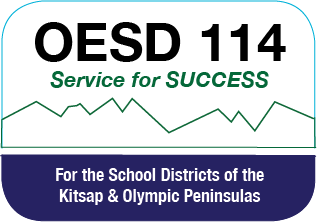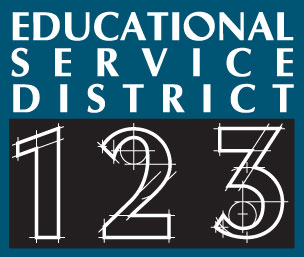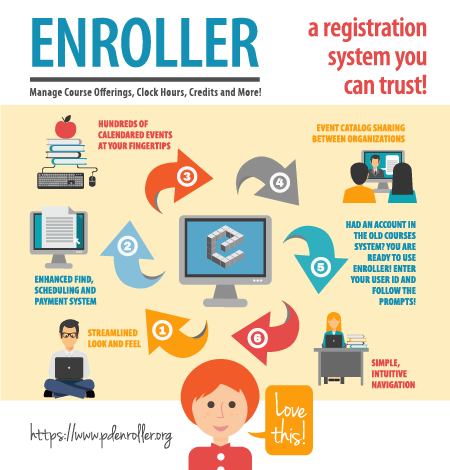Network Services
Providing Local Solutions with Statewide Support
ESDs and OSPI share a vision that every student will have access to high-quality education, and that all teachers are prepared and receive the support they need to ensure student success.
Stronger together, the nine ESDs are united in a shared goal – to help all students succeed.
While our partnership with OSPI to deliver statewide initiatives is primary, the success of the ESD network is dependent upon relationships and responsiveness at the local level. Each ESD builds innovative programs and services that meet the unique needs of schools and communities in its region of the state.
ESDs offer local support such as district business management, technology support, communications support, drop-out prevention, after-school programs, personnel cooperatives, early learning and parent resources based on regional needs. We are committed to creating quality instructional and operational programs that support large and small school districts in both urban and rural settings.
ESD Services
Accreditation
ESDs lead schools in a powerful and effective accreditation process. To date, more than 200+ schools throughout the state have successfully completed AESD’s initial/renewal accreditation process – a process open to all schools in Washington. The AESD Network plans to expand accreditation services in order to meet demand and ensure that our state’s schools are meeting high quality standards. Read More >
Climate Science
All nine Educational Service Districts (ESDs) in Washington are launching programs for science teacher training around Next Generation Science Standards (NGSS) and climate science, thanks to grant money made available to the Office of the Superintendent of Public Instruction (OSPI) by Governor Inslee. Distributed by OSPI, the ESDs are sharing $3 million from the state’s general fund for teacher professional development, development of instructional materials and student events. With an additional $1 million provided to community-based nonprofits to partner with public schools around NGSS, the $4 million appropriation makes Washington the first state in the country to dedicate significant funding for climate science education and NGSS.
Common Core State Standards (CCSS) Training
ESDs deliver common core training in English/Language Arts and Mathematics to districts statewide. Jointly sponsored by ESDs and OSPI, over 3,745 educators from 183 school districts have attended English Language Arts (ELA) trainings, and more than 6,424 educators from 231 school districts participated in Mathematics trainings. The continued funding of the Math and Science Coordinators and K-4 Early Literacy Coordinators is critical for the success of the CCSS initiative.
Early Learning
ESDs partner with districts and communities to provide direct service through Early Learning opportunities including Early Childhood Education and Assistance Program (ECEAP), Early Head Start and Head Start. ESDs provide grant management, liaison with state agencies, training, technical assistance, and overall program coordination for programs that serve income-eligible families and their children, prenatal to age five. Continued funding will ensure statewide capacity to o er comprehensive education, health, nutrition, and family support services to ensure all students are kindergarten ready.
Literacy Coordination and Training
ESDs provide the latest evidence-based research and best instructional practices in literacy instruction and assessment, consistent with OSPI’s transition plan to the Common Core State Standards for English Language Arts (ELA). Work is targeted at building teacher leadership capacity through the inclusion of ELA Fellows in regional literacy teams. In 2013-14, year two of the three year transition plan, ESDs provided continued training, collaborative study opportunities, and worked with educators to implement changes to instructional practice. Continued funding for K-4 Early Literacy Coordinators is crucial to the progress and success of this initiative and statewide full implementation in 2014-15.
Math, Science and STEM Coordination and Training
ESDs improve math and science instruction by providing equitable access to technical assistance and quality professional development. Current research confirms teaching practices aligned to math and science standards increase content knowledge among students. Algebra, geometry and biology students of teachers who participated in professional development demonstrated higher levels of achievement. Continued funding will sustain this comprehensive, coherent system of improving math and science performance.
Program Evaluation
AESD Program Evaluation Services are designed to help educational leaders generate actionable information that helps them do their most important work better. AESD’s Network of Nine is pleased to partner to provide evaluation services statewide and in each ESD region. We help you make strategic investments that support student learning.
Smarter Balanced Assessments
ESDs work to assure district implementation of Smarter Balanced Assessments is efficient and effective. ESDs offer training and information about the Smarter Balanced Assessment Consortium (SBAC) and the assessments that students will be taking at the end of the 2014- 2015 school year. ESDs help school districts interpret data from assessments to improve instruction.
Special Education and Support Services
ESDs provide both Special Education and Student Support Services to districts throughout each region. In Special Education, direct services are provided to many of the state’s smallest districts, and targeted support is assured for all districts in the state. In the area of student support ESDs work closely with OSPI to provide support to educators, families, students and community partners in creating high quality learning environments.
Student and School Success
ESDs partner with OSPI to support a statewide system that provides strong regional support to improve student achievement in all schools, especially those that struggle. In the past year, ESDs supported over 325 Priority, Focus, or Emerging schools across the state by delivering professional development, aligned to school action plans, for teachers and leaders in the school communities. This work builds system capacity in data-driven analysis and improvement planning. Sufficient funding resources are needed to continue this important and necessary work.
Teacher Principal Evaluation Project (TPEP)
ESDs work to assure district implementation of TPEP is efficient and effective. All provisional and probationary classroom teachers and principals in 2013–14 began using a new comprehensive evaluation. All classroom teachers, principals, and assistant principals will be evaluated under the revised system no later than September 2015. Continued funding is critical to the success and full implementation of the revised teacher and principal evaluation system.
WaKIDS
ESDs assure Washington’s students are kindergarten-ready by providing professional development and implementation support for WaKIDS (legislation requiring assessment of all students enrolled in state-funded full day kindergarten). ESDs have trained staff across 187 school districts to use the assessment. The assessment generates valid, reliable data on instructional practices, strengthens early learning collaboration, and helps advise state-level decisions about policy and funding. To continue full implementation of WaKIDS sufficient state and private funds are needed.
Washington ESDs serve:
- 1 million+ students
- 65,000+ K-12 educators
- 295 School Districts
- 2,393 Public Schools
- 792 Private Schools
- 16 Public Charter Schools
- 7 State Tribal Education Compact Schools (STECs)
- 2 State Schools

ESD 101 - NorthEast Washington
4202 S. Regal
Spokane, 99223-7738
tel: 509.789.3800
www.esd101.net
ESD 105
33 S. 2nd Ave.
Yakima, 98902-3486
tel: 509.575.2885
www.esd105.org
ESD 112
2500 N.E. 65th Ave.
Vancouver, 98661-6812
tel: 360.750.7503
www.esd112.org
ESD 113 - Capital Region
6005 Tyee Drive SW
Tumwater, 98512
tel: 360.464.6700
www.esd113.org
ESD 114 - Olympic
105 National Ave. N.
Bremerton, 98312
tel: 360.405.5801
www.oesd114.org/
ESD 121 - Puget Sound
800 Oakesdale Ave. SW
Renton, 98057
tel: 800.664.4549
www.psesd.org
ESD 123
3918 W. Court St.
Pasco, 99301
tel: 509.547.8441
www.esd123.org
ESD 171 - North Central
430 Old Station Road
Wenatchee, 98801
tel: 509.665.2610
www.ncesd.org
ESD 189 - Northwest
1601 R Avenue
Anacortes, 98221
tel: 360.299.4000
www.nwesd.org
Legislative Support Services
Professional Support provided by Melissa Gombosky
The AESD Executive Board is pleased to have Melissa Gombosky providing professional support for our association.
At the April 2007 Business Meeting the AESD membership approved increasing the level of professional support for the association. The Board identified the following areas in which the Legislative Liaison will direct efforts:
- ADVOCACY for ESDs with legislature and State agencies;
- SYSTEM AND ORGANIZATIONAL SUPPORT with all ESDs;
- LIAISON with other professional organizations and SPI
- COMMUNICATION, both internal and external, and
- OTHER priorities as identified by the Executive Board.
See Constitution 2016 for a copy of the approved AESD Constitution.
Contact
pdEnroller
ESD 101, ESD 112, ESD 113, OESD 114, PSESD, ESD 123, ESD 171, ESD 189 and OSPI have joined together to offer a centralized Professional Development Event Registration System called pdEnroller.
pdEnroller offers users an enhanced system for finding and scheduling professional development events, including:
- Enhanced, attractive look-and-feel
- Simple, intuitive navigation
- Expanded event catalog shared between organizations
- Improved payment system
- Expanded and integrated functionality










